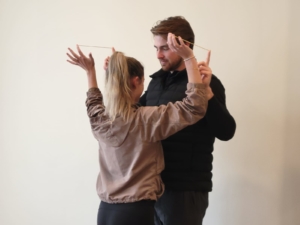Improve Communication with
Couples Counseling
Get on the Same Page with Couples Counseling for Communication and Understanding
We all want to feel supported and loved and we want our partner to feel the same way. But even with the best of intentions, many times we cannot communicate with each other in a way that leaves both partners feeling like they have been heard and understood. Our intentions get lost in frustration, anger, sadness, or numbness. Communication for couples can be complicated, but it doesn’t have to be…
You can learn how to really hear your partner and help them really hear you with by improving communication with couples counseling.
Why do we get stuck?
Communication is the number one issue that couples complain about. Many couples come to counseling thinking they just need a different format or language for the conversation. While this is undoubtedly true, there are other things to consider:
Emotional Patterns
Emotional patterns often get in the way of communications. Our partner says something that, because of sensitivities to past experience, we are unable to hear in the present moment.
EXAMPLE: Mark and Kate are expecting their first child. Kate says to Alan “I’m worried that we might start fighting when the baby comes.”Mark immediately reacts defensively, accusing Kate of criticizing him, and the conversation deteriorates from there because Mark and Kate have gotten stuck in a negative cycle. What is actually happening is that both partners are feeling some insecurity around this big change in their life. Kate wants to feel reassured, and Mark wants to feel appreciated. Knowing the underlying emotional needs is like having a key to a door to the other person’s world – what they really want, what is challenging for them. With that knowledge, we can use language that both conveys what we need to say and meets the needs of our partner.
Different Communication Styles
It is very common for couples to have different communication styles. Your partner is more of the quiet-type, you’re more expressive and passionate – often times, they feel overwhelmed and you feel as if they don’t care as much as you.
EXAMPLE: After getting into a fight, John needs time to digest while Jill needs quick resolution. John can’t say much until he goes out and walks the dog for a little while, but to Jill this feels like John wants out of the relationship, which activates her own insecurities. So instead of giving John the space he needs to process, Jill instigates him into responding in a way that leaves both of them more upset and disconnected. If John and Jill can learn to understand and respect each other’s styles, they can step out of conflict and into connection.
What can we do about it?

The key to improving communications is to uncover each other’s emotional needs. Couples therapy can help you understand these needs and respond to them in a way that supports connection with each other. Once we learn how to talk about our needs in an authentic, direct way with our partner, communication becomes easier.
We create a relationship that is based on real mutuality, speaking in a way that is beneficial for both partners.
Once you understand the underlying emotional needs, it becomes much easier to tailor specific communication strategies that will work for both of your styles. This could include how to start a conversation, how to talk about your own experience rather than criticizing the other, how to make the other feel really understood, using empathic listening vs. problem solving listening and more.
In this way, you can find ways to speak honestly and kindly to each other. Communication is an opportunity to get closer to your partner. Once you master how to continuously improve communication with couples counseling, you can discuss even the most sensitive of topics while still feeling connected. This will strengthen your trust and commitment to each other.
Tip: Pay attention to non-verbal communication
When we are in distress, we tend to misinterpret our partner’s body language. Our partner makes a certain face and we assume they are angry or annoyed so we react to that when, in fact they may not feel that way and might get upset back at our reaction. A counselor can help you learn how you are affected by each other’s non-verbal communications and how to verify your interpretation of it.
Learn How to Understand Each Other
Real Change is Possible!
Most couples wait too long before they ask for the help that they desperately need. If you’re reading this page, chances are that it’s time for you to take action and seek communication therapy. Our couples therapists in San Francisco, Berkeley, and Palo Alto specialize in helping couples like you navigate challenges and create a fulfilling, passionate relationship.
